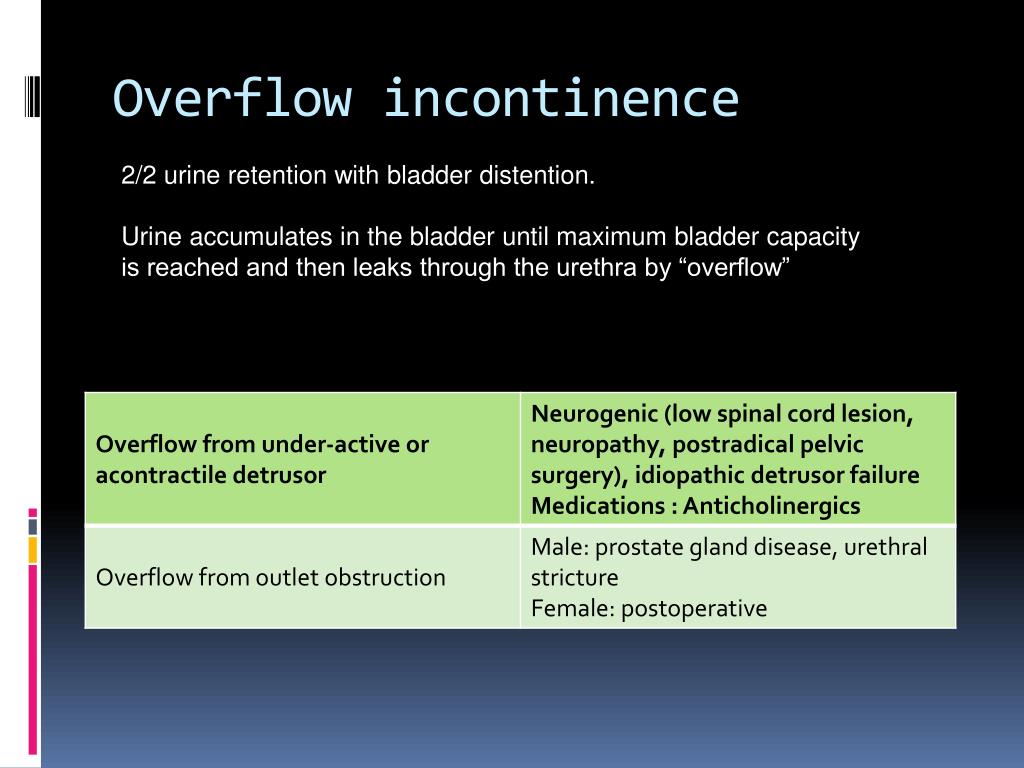

injury to your spinal cord – this can disrupt the nerve signals between your brain and your bladder.It can mean you either pass large amounts of urine constantly, or you pass urine occasionally with frequent leaking in between. Total incontinence is when your bladder cannot store any urine at all. there's damage to your nerves – for example, as a result of surgery to part of your bowel or a spinal cord injury.Your detrusor muscles may not fully contract if: As a result, the bladder becomes stretched. Overflow incontinence may also be caused by your detrusor muscles not fully contracting, which means your bladder does not completely empty when you urinate. an enlarged prostate gland (if you have a penis).Your bladder may fill up as usual, but because of an obstruction, you will not be able to empty it completely, even when you try.Īt the same time, pressure from the urine that's left in your bladder builds up behind the obstruction, causing frequent leaks. Overflow incontinence, also called chronic urinary retention, is often caused by a blockage or obstruction affecting your bladder. conditions affecting the lower urinary tract (urethra and bladder) – such as urinary tract infections (UTIs) or tumours in the bladder.not drinking enough fluids – this can cause strong, concentrated urine to collect in your bladder, which can irritate the bladder and cause symptoms of overactivity.The reason your detrusor muscles contract too often may not be clear, but possible causes include: This is known as having an overactive bladder. Sometimes the detrusor muscles contract too often, creating an urgent need to go to the toilet. The detrusor muscles relax to allow the bladder to fill with urine, then contract when you go to the toilet to let the urine out. The urgent and frequent need to pass urine can be caused by a problem with the detrusor muscles in the walls of your bladder. certain connective tissue disorders such as Ehlers-Danlos syndrome.neurological conditions that affect the brain and spinal cord, such as Parkinson's disease or multiple sclerosis.damage to the bladder or nearby area during surgery – such as the removal of the womb (hysterectomy), or removal of the prostate gland.increased pressure on your tummy – for example, because you are pregnant or obese.damage during childbirth – particularly if your baby was born vaginally, rather than by caesarean section.Problems with these muscles may be caused by: Your urethra may not be able to stay closed if the muscles in your pelvis (pelvic floor muscles) are weak or damaged, or if your urethral sphincter – the ring of muscle that keeps the urethra closed – is damaged. Your urethra is the tube that urine passes through to leave the body.Īny sudden extra pressure on your bladder, such as laughing or sneezing, can cause urine to leak out of your urethra if you have stress incontinence.

Stress incontinence is when the pressure inside your bladder as it fills with urine becomes greater than the strength of your urethra to stay closed. If the cause can be treated, this may cure your incontinence. Some of the possible causes lead to short-term urinary incontinence, while others may cause a long-term problem. This can happen for several reasons.Ĭertain factors may also increase your chance of developing urinary incontinence. Urinary incontinence is when the normal process of storing and passing urine is disrupted.


 0 kommentar(er)
0 kommentar(er)
